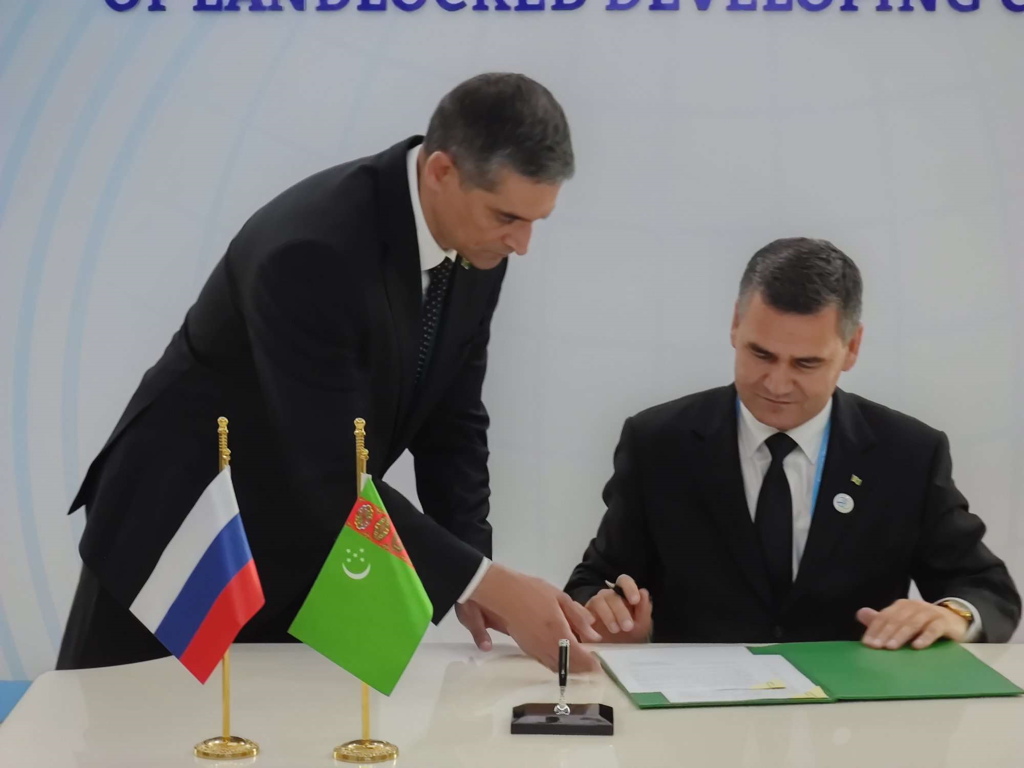Turkmenistan has signed separate bilateral documents with Russia, Georgia, and Moldova to develop transport cooperation.
The documents were signed on the sidelines of the Ministerial Transport Conference of Landlocked Developing Countries titled “Ashgabat Process: Funding for Better Connectivity” and held at the Avaza national resort, in Turkmenistan, on August 16, according to the Turkmen news website Orient.
The Director-General of the Agency for Transport and Communications under Turkmenistan’s Cabinet of Ministers, Mammetkhan Chakiyev, and Russian Transport Minister Vitaly Savelyev signed a memorandum of understanding between the agencies they head in order to develop international road transportation.
Chakiyev also signed similar agreement with Moldovan Deputy Prime Minister Andrei Spinu, the report added.
As part of another meeting, the Chairman of the Turkmen Agency for Sea and River Routes, Annadurdy Kosyayev, and Georgian Deputy Foreign Minister Aleksander Khvtisiashvili signed a memorandum of understanding between the sea transport agencies of the two countries.
The Ministerial Transport Conference of Landlocked Developing Countries took place under the auspices of the United Nations on August 15-16. The heads of transport agencies of the countries of Central Asia, the Middle East, and Africa discussed the prospects for joint development and digitalization processes in this area and announced decisions and initiatives to improve the financing of the transport industry in the aftermath of the pandemic and consider other issues.
Addressing the conference, UN Secretary-General António Guterres said that transport connectivity was critical to the future of the countries, in particular, in terms of reducing the cost of trade and improving access to global markets, as well as promoting the integration of economies and people. Referring to great obstacles to improving the transport interconnection of landlocked countries, Guterres said that a large number of border crossings, complex transport, and border procedures, and restrictions imposed by the pandemic have resulted in costs and delays.
Meanwhile, Turkmenistan’s Deputy Prime Minister and Foreign Minister Rashid Meredow, and UAE Minister of Energy and Infrastructure Suhail Al Mazrouei held a meeting on the sidelines of the transport forum on August 15. The sides discussed opportunities for opening transport and logistics routes and establishing cooperation between the port of Turkmenbashi and the ports of Dubai and Abu Dhabi, as well as the integration of the Turkmen port into the world system of seaports.
In addition, Turkmenistan, Iran, Uzbekistan, and Kazakhstan signed the final Additional Protocol to the Agreement on the Establishment of an International Transport and Transit Corridor (the Ashgabat Agreement) at the second meeting of the Coordinating Council of the participating countries of this Agreement held in Avaza, on August 15.
The participants of the meeting reviewed a number of issues related to the simplification of the visa regime for participants of international road transportation, and the removal of barriers to the development of bilateral and transit road cargo transportation. They also discussed the unification and definition of a single end-to-end tariff in rail freight transportation, as well as the parity amounts of fees and payments charged when crossing state borders for transport services related to road transportation.
Numerous transit and transport corridors have been created in the region, where the Central Asian states act as logistics hubs connecting Asian and African countries with the rest of the world.
With an aim to develop important regional and interregional transport routes running through Turkmenistan on the North-South and East-West directions, the country has launched large-scale projects, including those for the construction of railway, the seaport in Turkmenbashi town, highway bridges, as well as the reconstruction of airports.
Launched in 2018, the seaport in Turkmenbashi is capable of handling 17 million tons of goods per year with the possibility of expanding its capacity to 27 million tons. Officials in Turkmenistan have repeatedly declared the country’s intent to integrate the port into the East-West and North-South transportation corridors.
While the East-West trade corridors, known as TRACECA, is an international transport program involving the European Union and 13 member States of the Eastern European, Caucasian and Central Asian region, the International North–South Transport Corridor (INSTC) is a network of ships, roads and rails that will move cargo between India, Iran, Azerbaijan, Afghanistan and the Central Asian region as well as Russia and Europe.







 Iran's senior military leaders described the drone and missile attack on Israel on April 14 night as “successful".
Iran's senior military leaders described the drone and missile attack on Israel on April 14 night as “successful".
 The number of evacuees from flooded areas in Kazakhstan has reached 97,852 people, including about 32,856 children since March 27.
The number of evacuees from flooded areas in Kazakhstan has reached 97,852 people, including about 32,856 children since March 27.
 Iranian President Ebrahim Raisi warned Israel that it would face a "real and extensive" response if it makes any "mistake" following Tehran’s missi...
Iranian President Ebrahim Raisi warned Israel that it would face a "real and extensive" response if it makes any "mistake" following Tehran’s missi...



